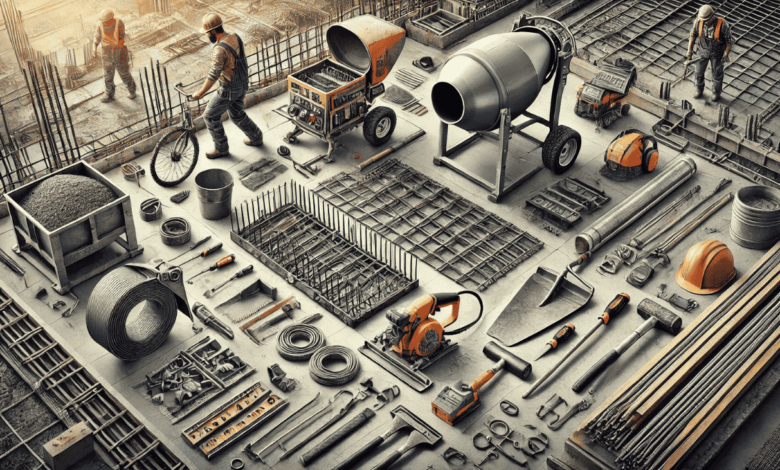The Ultimate Guide to Concrete Tools: Types, Uses, and Buying Tips

Concrete is the backbone of modern construction, providing strength and durability to buildings, roads, and infrastructure. Whether you’re a professional contractor or a DIY enthusiast, having the right concrete tools can make all the difference in achieving a smooth, strong, and professional finish. In this guide, we’ll explore the essential concrete tools, their uses, and how to choose the best ones for your project.
Understanding Concrete Tools
Concrete work requires precision, and having the correct tools ensures efficiency and quality. From mixing to finishing, each stage of the process demands specialized equipment. Here are some must-have concrete tools and their functions.
Essential Concrete Tools for Every Project
Mixing and Pouring Tools
Before concrete can be shaped and finished, it must be mixed properly. These tools help with the preparation and pouring process:
- Concrete Mixer – Ideal for large projects, a powered mixer ensures even consistency and saves time.
- Mixing Tub & Hoe – For smaller jobs, a mixing tub and a hoe can effectively blend concrete.
- Wheelbarrow – Used to transport mixed concrete to the pouring site.
- Concrete Bucket – Essential for lifting concrete to higher levels in construction projects.
Spreading and Leveling Tools
Once the concrete is poured, it must be spread and leveled properly:
- Screed – A long, straight edge used to smooth and level freshly poured concrete.
- Concrete Rake – Helps distribute concrete evenly across a surface.
- Bull Float – Used to flatten and smooth out the surface before it sets.
Finishing and Detailing Tools
To achieve a polished and professional appearance, the following concrete tools are essential:
- Steel Trowel – Creates a smooth and compact surface.
- Magnesium Float – Removes imperfections and improves surface consistency.
- Edger & Groover – Used for creating joints and rounded edges to prevent cracks.
Cutting and Drilling Tools
After concrete hardens, modifications may be needed. These tools make cutting and drilling more manageable:
- Concrete Saw – Used for cutting expansion joints or making precise cuts in slabs.
- Diamond Blade – Ensures smooth and efficient cutting.
- Core Drill – Essential for creating openings for pipes and wiring.
Reinforcement and Safety Equipment
Concrete is strong, but reinforcement adds extra durability:
- Rebar Cutter & Bender – Helps shape and cut rebar for reinforcement.
- Tie Wire Twister – Secures rebar in place.
- Protective Gear – Gloves, goggles, and masks protect against dust and chemicals.
Choosing the Right Concrete Tools
With so many concrete tools available, selecting the right ones depends on your project size, budget, and expertise. Here are some tips:
- Assess Your Project – Small DIY projects may only require basic tools, while professional work demands high-quality equipment.
- Invest in Quality – Durable tools last longer and deliver better results.
- Consider Versatility – Multi-use tools can save money and storage space.
- Prioritize Safety – Ensure tools are ergonomic and come with safety features.
Top Brands for Concrete Tools
When buying concrete tools, quality brands make a difference. Some trusted names in the industry include:
- Marshalltown – Known for premium finishing tools.
- Makita – Offers durable power tools for concrete work.
- De Walt – Specializes in cutting and drilling equipment.
- Husqvarna – Provides high-performance concrete saws and diamond blades.
Where to Buy Concrete Tools
You can purchase concrete tools from:
- Online Retailers – Amazon, Home Depot, and Lowe’s offer a wide selection.
- Local Hardware Stores – Ace Hardware and Menards stock essential tools.
- Specialty Suppliers – ConcreteToolSupply.com specializes in professional-grade tools.
FAQs About Concrete Tools
What are the most essential concrete tools?
The most essential concrete tools include mixers, trowels, floats, screeds, saws, and protective gear. These tools ensure efficiency and quality in concrete projects.
How do I choose the best concrete tools?
Choose concrete tools based on the project size, material durability, ease of use, and brand reputation. Investing in high-quality tools ensures better performance and longevity.
Are electric concrete tools better than manual ones?
Electric concrete tools like power trowels and saws save time and effort, making them ideal for large-scale projects. However, manual tools are more affordable and suitable for small jobs.
Can I rent concrete tools instead of buying?
Yes! Many home improvement stores and equipment rental companies offer concrete tools for rent, which is a great option for one-time projects.
Conclusion
Using the right concrete tools is crucial for any construction project, whether you’re laying a small patio or working on a large-scale build. From mixing and pouring to finishing and cutting, each tool plays a vital role in ensuring durability and a polished appearance. Investing in quality tools and knowing their functions will help you achieve professional results while saving time and effort.
If you’re serious about achieving the best concrete work, ensure you have the right concrete tools for the job. Whether you purchase or rent them, choosing high-quality tools will make a significant impact on your project’s success. Ready to start your next concrete project? Equip yourself with the best concrete tools and get the job done right!



